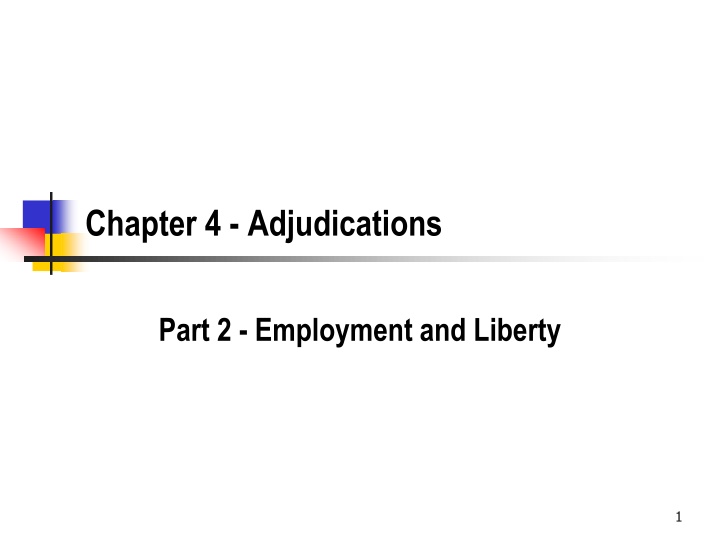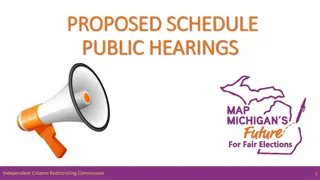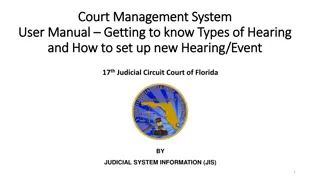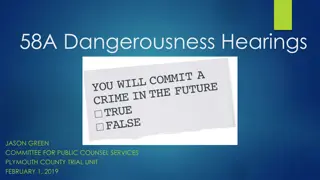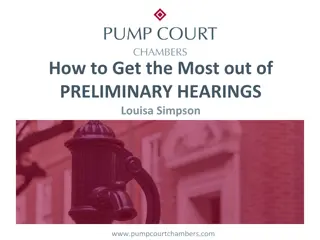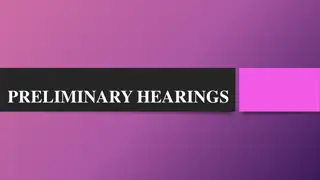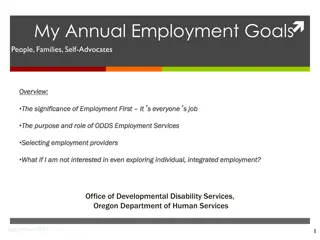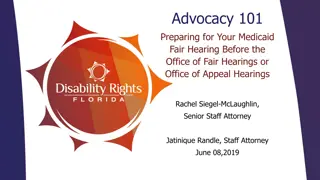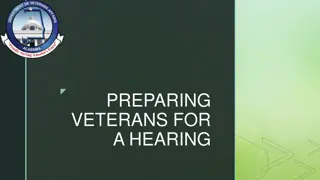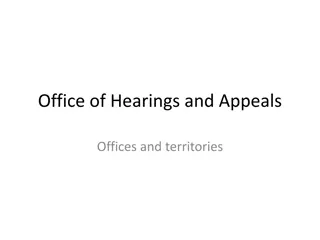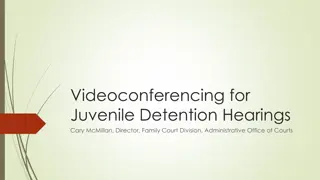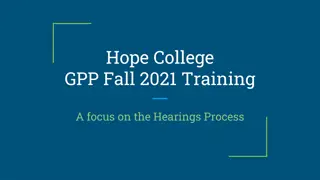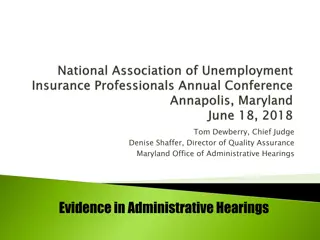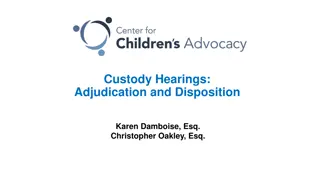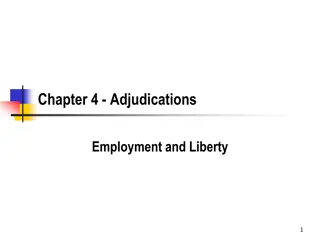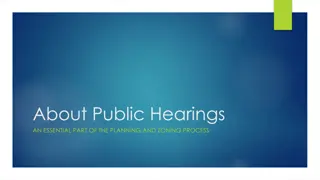Employment Hearings and Due Process Rights Overview
The content delves into the importance of employment hearings in cases of wrongful termination, focusing on the Goldberg framework and due process requirements. It highlights the key aspects like pre-termination hearings, the role of an independent decision-maker, and the significance of factual disputes in determining the necessity of a hearing. Exploring the constitutional rights of government employees and the variations in state laws regarding employment due process, the information emphasizes the role of hearings in challenging agency decisions and potential outcomes for clients. Case references like Codd v. Velger and Perry v. Sinderman provide additional insights into the legal context surrounding employment hearings and due process rights.
Download Presentation

Please find below an Image/Link to download the presentation.
The content on the website is provided AS IS for your information and personal use only. It may not be sold, licensed, or shared on other websites without obtaining consent from the author.If you encounter any issues during the download, it is possible that the publisher has removed the file from their server.
You are allowed to download the files provided on this website for personal or commercial use, subject to the condition that they are used lawfully. All files are the property of their respective owners.
The content on the website is provided AS IS for your information and personal use only. It may not be sold, licensed, or shared on other websites without obtaining consent from the author.
E N D
Presentation Transcript
Chapter 4 - Adjudications Part 2 - Employment and Liberty 1
Goldberg Framework Pre-termination hearings based on the severity of the injury of a wrongful termination. Basic APA due process requirements Independent decisionmaker Notice Written record and reasons Right to confront evidence Oral hearing if needed for fairness 2
When do you get a hearing at all? Goldberg applies after the determination that your client gets a hearing. It is about timing and procedure. The legal purpose of a hearing is to resolve factual disputes. Hearing have other social purposes, such giving aggrieved parties a sense of fairness. If there is no factual dispute, then there is no legal basis for a hearing. Codd v. Velger, 429 U.S. 624 (1977) (suicidal policeman) 3
Employment Hearings These are an important class of hearing and a good example of facts in issue question. 4
Employment Hearings Only government employees have constitutional rights to a hearing and due process States and congress can create rights to employment due process for private employees. Statutory schemes are the subject of the Employment Law course. State rights are defined by the state law, not the US constitution, and can be broader than the US constitutional rights States cannot provide less than the US Constitutional minimum due process. 5
Key Question: What is the purpose of the hearing? Getting your client a hearing does not mean that your client can keep the job. It gives you a chance to require the agency to show on the record why it fired or disciplined your client. If the agency has built the record, you are likely to lose. 6
Why Bother with the Hearing if the Client will Lose Anyway? Many agencies, especially state and local government agencies, do not do a great job at building records. Even if there is a record, the hearing process may point out other, improper reasons for firing. A public hearing may bring political pressure on the agency to reconsider the action. Your client may want his/her day in court. You have an ethical duty to explain that it might be futile. 7
Perry v. Sinderman, 408 U.S. 593 (1972) Facts Taught for 10 years University policy was to not fire without cause after 7 years Fired without cause What process did he want? 8
What is the Factual Question? There were no allegations of bad behavior. Just a contract non-renewal. Why was the university policy on continued employment critical? How does it create an expectation of continued employment? Without an expectation of continued employment, are there any facts at issue? 9
Boards of Regents v Roth, 408 U.S. 564 (1972) What were the terms of the contract? One year, not expectation of rehire He was not rehired at the end of the year Even if there had been a tenure system, had he triggered it? Was there a continued expectation of employment, and thus a factual issue for a hearing? 10
Roth and Stigma/Bad Reasons for Firing Roth claimed, but did not get before the court, that he had been fired for an improper reason. A governmental employee without expectation of continued employment can be non-renewed for no reason, but not for a bad reason. The University does not renew contracts on black employees. This is a key lawyering issue for situations in which there is no expectation of continued employment. 11
University Staff Staff No right of continued employment, but cannot be fired for bad reasons. Pure state employees Research Faculty/Artists in Residence, etc. Year to year appointments, with absolute bar on expectation of continued employment. 12
Tenured faculty Must be meet tenure standards or leave in 6 years. Expectation of continued employment. Good cause for firing. Academic freedom has little meaning beyond pure first amendment rights for conduct unrelated to the job. 13
Ivor van Heerden case Ivor van Heerden case No expectation of continued employment, thus University wins. Round II LSU Settles on stigma + claims Van Heerdan claims he was fired for bad reasons. He documented extensive unprofessional comments by university personnel in emails about him. University settled. 14
New Property v. Old Property How do these cases create the "new property" How are the rights different for new property versus old property? How is the process different if I take your medical license, versus taking your land? What if I abolish your job or your welfare entitlement through legislation? Through a regulation - a rule, not an adjudication. How strong is the notion of new property? 15
Liberty Interests What is a liberty interest? What are examples? How is a liberty interest different from a property interest? In prison cases, at least, courts tend to talk about liberty interests when the plaintiff is about to lose If it is not going to be protected, the court calls it a liberty interest. 16
Mitigation If the decisionmaker has disciplinary alternatives, those can create facts at issue. Cleveland Bd. of Ed. v. Loudermill, 470 U.S. 532, 542- 544 (1985) Even where the facts are clear, the appropriateness or necessity of the discharge may not be; in such cases, the only meaningful opportunity to invoke the discretion of the decisionmaker is likely to be before the termination takes effect. 17
Melissa I Melissa is charged with plagiarism, which can result in expulsion from the (state) law school What is the purpose of granting her a hearing? What issues should she raise? What should the school present to support its case as the moving party? What is the value of the record of the hearing? Should she get a hearing? What about cancelling her scholarship without a hearing? 18
Melissa II Melissa admits she plagiarized, but claims extenuating circumstances. Thinking about the reasons for a hearing from Melissa I, how are these factors changed by her admission? How has the burden of proof shifted? Is there any factual dispute to resolve? What if the law school has discretion in the type of punishment for plagiarism? 19
Wisconsin v. Constantineau, 400 U.S. 433 (1971) A state law required the posting of the names of public drunkards at places where alcoholic beverages are sold What was his injury? Did Paul concede that he was a public drunkard? Does this put facts in issue? What were the provisions for challenging being on the list? What did the United States Supreme Court hold? 20
Stopped here 21
Paul v. Davis, 424 U.S. 693 (1976) Note that this is the same term as Matthews think about whether they are related when we read Matthews. The sheriff gave out a list of "active shoplifters," including persons who had been arrested but not convicted How did the court distinguish Constantineau? What did he claim as an injury in this case? Could he still shop? Was there stigma +? How might the Internet change the analysis? 22
Alternative Remedies What did Rehnquist say was his remedy if the characterization was incorrect? We will learn that suing state officials for torts is difficult. What are the limits of such a remedy? Is he a sympathetic plaintiff? Is this realistic alternative? 23
Perverts R Us WWW sites: Connecticut Dept. of Public Safety v. Doe, 538 U.S. 1 (2003) The state is going to list all persons convicted of a list of sexually related crimes on a public registry. What is the impact of this on the listed persons? What if you are on the list because of public indecency pissing in public during Mardi Gras? Plaintiff wants a hearing on before he is listed. What is the factual basis for being included? Prior conviction Are there facts in issue? 24
Why isn't this an additional punishment? When did plaintiff get his due process? Original trial What if he plead out? Did he agree to this later listing? Why isn t this punishment? Why do we do the listing? Remember Kansas v. Hendricks? 25
Public Registries for Sex Offenders Why are these popular? What is the policy justification? How does this affect the offender's ability to get a job or have a place to live? How narrow are the grounds for being on the list? How does this contribute to the guy in CA who was on the list but was able to keep a kidnap victim hostage for nearly two decades? 26
Terrorist Watch Lists Where do these fit in our system? Are they like sexual offender lists? Are they like drunkard lists? What is the injury? What is the national security issue and how does it change the rights calculation? This becomes a Matthews issue. 27
The Reference Problem Codd v. Velger, 429 U.S. 624 (1977) Plaintiff claimed that putting the information about suicide in his personnel file damaged his reputation and made it impossible for him to find other employment as a policeman. Why didn't the court say that the plaintiff could just request that the file not be forwarded to a new employer? The circuit court created a right to a hearing or the right to have the information excluded. This is dicta, since the case was decided on other grounds by the United States Supreme Court: Nowhere in his pleadings or elsewhere has respondent affirmatively asserted that the report of the apparent suicide attempt was substantially false. at 627 How does this modify the lower court s opinion? 28
Siegert v. Gilley, 500 U.S. 226 (1991) Forced to resign Fired from the new job based on the bad recommendation - unethical and incompetent Why does stigma plus fail? Was the recommendation letter false? If this is not a due process/stigma plus case, what is it? What is the action for injuring his reputation? What is the defense? What are the risks if employers are reticent to give bad recommendations, or any recommendations at all? 29
Melissa III Melissa was charged with plagiarism but was not provided any due process protections. Fearful of a lawsuit, the law school did not expel her, but upon her graduation it sent a letter to the State Board of Bar Examiners informing the Board that Melissa had engaged in plagiarism in Legal Writing during her first year. Have her due process rights been violated under Siegert? Is this like a recommendation letter? Is this fair? What is her remedy? 30
Melissa IV Melissa is charged with plagiarism, expelled from law school without a hearing, and the plagiarism is entered on her transcript. She sues, saying this injury to reputation rises to the level of violation of her liberty interests. The law school say that the transcript is confidential, and no one will see it unless she releases it. 31
Homeland Security and the CIA One of the big fights over the Homeland Security Bill was its limitation of employee hearing rights National security agency personnel are subject to firing without stated cause and get no hearing. The Homeland Security Act extends the definition of a national security job to many more employees, who thus lose civil service protection Why do this? Is this a good idea? 32
Prisons Are prisons part of the criminal law system or the administrative law system? Why have prison populations doubled and tripled relative to the population over the past 30 years? Learning to think like an economist: Who benefits from tough laws, esp. drug laws? Who benefits from prisons? What is the tradeoff for the increased prison budgets? 33
State Prison Litigation: 42 USC 1983 Based on deprivations of civil rights. Due process claims, such as Sandin "Cruel and unusual punishment claims" which generally deal with conditions of confinement or medical care. Prison Litigation Reform Act of 1995 requires exhaustion of remedies in prison litigation, even if the administrative system cannot provide the requested remedy, if the system can provide some remedy Cases against Federal prisons are brought under Bivens or the FTCA. 34
Prisoners as Litigants Successful litigation is mostly by NGOs - ACLU, prison rights organizations, AIDS organizations Individual prisoners Do prisoners have a lot to do with their time? Do most prisoners have sophisticated legal talents? Do prisoners like to give the prison grief? What is most prisoner litigation going to look like? 35
Due Process Claims Due process claims require the plaintiff to show that he had a liberty interest in the proceeding. Even if the court finds a liberty interest, that just lets the prisoner get a hearing or get into court. Courts generally defer to the prison on matters of discipline and security 36
Good Time Credits and Parole to Reduce Time Served Are these constitutionally required? Why have them? The Sentencing Reform Act of 1984 eliminated parole and reduced good time credits in the federal system Combined with the expansion of federal crimes, this has led to an explosion of federal prisoners Same in many states 37
Cases that Affect Time Served Why would procedures that affect release dates get the most legal protection? Return to prison for a parole violation (Gagnon) Should the prisoner get a hearing? Why - what might be contested? Decisions reducing good time credits or affecting parole (Morrissey/Wolff) How do these look like Goldberg benefits? 38
Sandin v Conner, 515 U.S. 472 (1995) Prisoner got 30 days in solitary as punishment. Is this cruel and unusual? (remember, it has to be both) Is he entitled to a hearing? Only when discipline "imposes atypical and significant hardship on the inmate in relation to the ordinary incidents of prison life" is due process implicated. The Court rejected a claim that punishment of solitary confinement for 30 days was enough to trigger due process requirements. What do many countries think of solitary confinement? 39
Wilkinson v. Austin, 125 S.Ct. 2384 (2005) The Court concluded that indefinite placement in a "supermax" prison together with a disqualification from parole was enough to trigger due process requirements. What does it mean to be in a supermax prison? Why do we put inmates in them? Wonder if the supermax mattered at all? Does a hearing before the prison officials really mean much? 40
What rights does a prisoner retain? Some freedom to exercise religion Some limited right to communicate with the outside A little bit of free speech Some bodily integrity, at least in the area of medical care Freedom from beatings and the like through FTCA/Bivens, 42 USC 1983, and state laws. 41
Trade-offs in Prison Regulations Assume you have been hired to develop a new set of prison regulations for Angola. What are the tradeoffs you must deal with? What happens if prisoners have lots of rights? What if prisoners have no rights? Do more detailed regulations increase or reduce prison discretion? Increase or reduce conflicts over rules? Corruption of prison officials? 42
